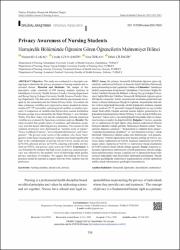| dc.contributor.author | Kulakaç, Nursen | |
| dc.contributor.author | Uzun Şahin, Ceyda | |
| dc.contributor.author | Özkan, Esra | |
| dc.contributor.author | Çilingir, Dilek | |
| dc.date.accessioned | 2023-02-15T10:27:04Z | |
| dc.date.available | 2023-02-15T10:27:04Z | |
| dc.date.issued | 2021 | en_US |
| dc.identifier.citation | Kulakaç, N., Uzun Şahin, C., Özkan, E. & Çilingir, D. (2021). Privacy Awareness of Nursing Students. Türkiye Klinikleri Hemşirelik Bilimleri Dergisi, 13(2), 330-337. http://doi.org/10.5336/nurses.2020-78242 | en_US |
| dc.identifier.issn | http://doi.org/10.5336/nurses.2020-78242 | |
| dc.identifier.uri | http://doi.org/10.5336/nurses.2020-78242 | |
| dc.identifier.uri | https://hdl.handle.net/11436/7603 | |
| dc.description.abstract | Objective: This study was conducted in a descriptive design type to determine the privacy awareness of nursing students and associated factors. Material and Methods: The sample of this
descriptive study consisted of 490 nursing students studying in
Gümüşhane University Health Sciences Faculty Nursing Department
and Recep Tayyip Erdogan University Health Sciences Faculty Nursing Department. The data were collected with the questionnaire developed by the researchers and the Patient Privacy Scale. To evaluate the
data, continuous variables were expressed as mean, standard deviation,
median (25th-75th percentile), and categorical variables as numbers (percent). A comparison of variables that did not show normal distribution
between groups was evaluated by the Mann-Whitney U test, KruskalWallis, Post-Hoc Tukey test and the relationship between numerical
variables was evaluated by Spearman correlation analysis. Results: The
study revealed that gender, place of residence, and education on privacy were the factors affecting privacy awareness. The reasons for the
violation of privacy were determined as "careless work of nurses",
"heavy workload of nurses", "environmental deficiencies", and "emergencies". The privacy scale scores of the students who chose 'emergencies' as the factor causing privacy violation were found significantly
high in the confidentiality of private life (p=0.021), sexual privacy
(p=0.014), physical privacy (p=0.039), ensuring a favorable environment (p=0.014), and privacy scale scores (p=0.007). Conclusion: It
was found that the students had high scores on privacy, and patient privacy was affected by the students’ level of knowledge about gender,
privacy, and place of residence. We suggest that training for privacy
practices should be repeated at regular intervals when students start the
profession. | en_US |
| dc.description.abstract | Amaç: Bu çalışma, hemşirelik bölümünde öğrenim gören öğrencilerin mahremiyet bilincini ve bununla ilişkili faktörleri belirlemek
amacıyla tanımlayıcı tipte yapılmıştır. Gereç ve Yöntemler: Tanımlayıcı
türdeki araştırmanın örneklemini Gümüşhane Üniversitesi Sağlık Bilimleri Fakültesi Hemşirelik Bölümü ve Recep Tayyip Erdoğan Üniversitesi Sağlık Bilimleri Fakültesi Hemşirelik Bölümünde öğrenim gören
490 öğrenci oluşturdu. Veriler araştırmacılar tarafından geliştirilen soru
formu ve Hasta Mahremiyet Ölçeği ile toplandı. Araştırmadan elde edilen verilerin değerlendirilmesinde, sürekli değişkenler ortalama, standart
sapma, medyan (25-75. persentil), kategorik değişkenler ise sayı (yüzde)
olarak ifade edildi. Gruplar arasında normal dağılım göstermeyen değişkenlerin karşılaştırılması Mann-Whitney U testi, Kruskal-Wallis test,
“post-hoc” Tukey testi ve sayısal değişkenler arasındaki ilişki ise Spearman korelasyon analizi ile değerlendirildi. Bulgular: Cinsiyet, yaşanılan
yer ve mahremiyet ile ilgili eğitim alma durumu mahremiyet bilincini
etkileyen faktörler olduğu görüldü. Mahremiyet ihlalinin nedeni “hemşirelerin dikkatsiz çalışması”, “hemşirelerin iş yükünün fazla olması”,
“ortamdan kaynaklanan eksiklikler” ve “acil durumların olması” olarak
belirlendi. Mahremiyet ihlaline neden olan faktörlerden “acil durumların olmasını” belirten öğrencilerin özel hayatın gizliliği (p=0,021), cinsiyete ilişkin mahremiyet (p=0,014), bedensel mahremiyet (p=0,039),
uygun ortam oluşturma (p=0,014) ve mahremiyet ölçeği puanlarının
(p=0,007) anlamlı olarak yüksek olduğu saptandı. Sonuç: Araştırma sonucunda, öğrencilerin mahremiyete yönelik puanlarının yüksek olduğu,
hasta mahremiyetinin cinsiyet, yaşanılan yer ve öğrencilerin hasta mahremiyeti hakkındaki bilgi düzeyinden etkilendiği görülmüştür. Meslek
hayatına geçildiğinde mahremiyet uygulamalarına yönelik eğitimlerin
aralıklı olarak tekrarlanması gerektiğini önermekteyiz | en_US |
| dc.language.iso | eng | en_US |
| dc.publisher | Türkiye Klinikleri Yayınevi | en_US |
| dc.rights | info:eu-repo/semantics/openAccess | en_US |
| dc.subject | Nursing students | en_US |
| dc.subject | Patient care | en_US |
| dc.subject | Privacy | en_US |
| dc.subject | Hemşirelik öğrencileri | en_US |
| dc.subject | Hasta bakımı | en_US |
| dc.subject | Mahremiyet | en_US |
| dc.title | Privacy awareness of nursing students | en_US |
| dc.title.alternative | Hemşirelik bölümünde öğrenim gören öğrencilerin mahremiyet bilinci | en_US |
| dc.type | article | en_US |
| dc.contributor.department | RTEÜ, Sağlık Hizmetleri Meslek Yüksekokulu, Tıbbi Hizmetler ve Teknikler Bölümü | en_US |
| dc.contributor.institutionauthor | Uzun Şahin, Ceyda | |
| dc.identifier.doi | 10.5336/nurses.2020-78242 | en_US |
| dc.identifier.volume | 13 | en_US |
| dc.identifier.issue | 2 | en_US |
| dc.identifier.startpage | 330 | en_US |
| dc.identifier.endpage | 337 | en_US |
| dc.relation.journal | Türkiye Klinikleri Hemşirelik Bilimleri Dergisi | en_US |
| dc.relation.publicationcategory | Makale - Uluslararası Hakemli Dergi - Kurum Öğretim Elemanı | en_US |


















